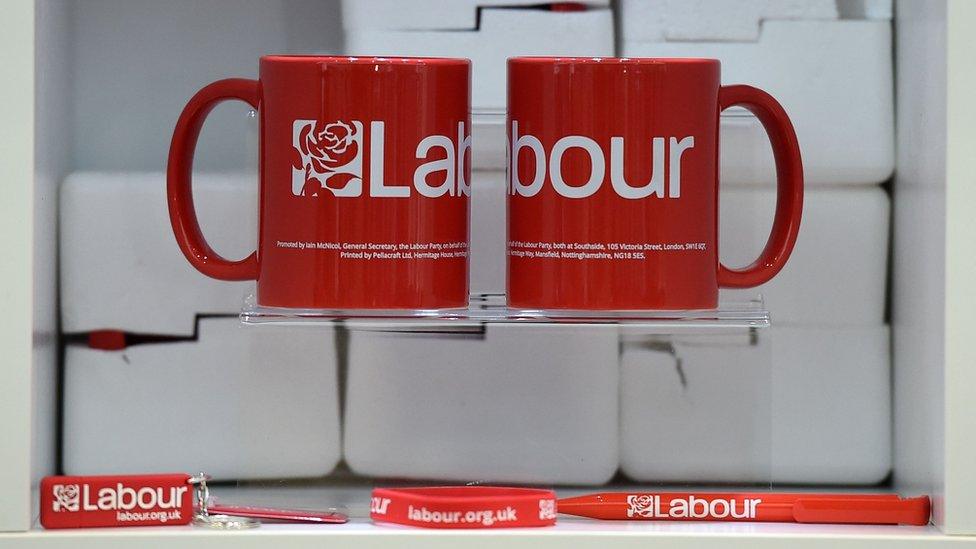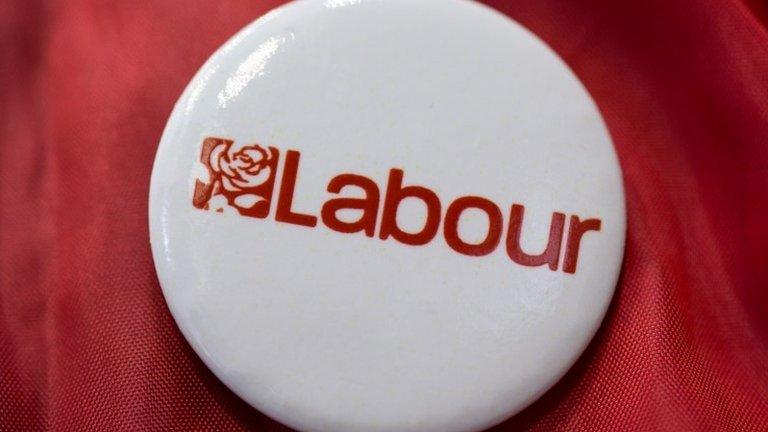Contest to become Labour's top official heats up
- Published
- comments

The shortlist of candidates to replace Jennie Formby as Labour's top official is being finalised on Thursday.
If you think this is a relatively dull administrative process, then think again.
There could be a stand-off resembling the denouement of Reservoir Dogs - minus the guns.
One candidate who has emerged as a leadership favourite for the post of general secretary is David Evans.
He is a former assistant general secretary of the party, who played a key backroom role in the 2001 general election victory under Tony Blair.
As a Labour official, he also drew up a paper designed to reform the party's organisation.
This was aimed at taking powers away from left-wing activists, and giving more say to the wider membership, which was more moderate than today.
He set up a consultancy, the Campaign Company, after leaving the party's head office, which forged close links with some Labour councils and councillors.
Labour leader Sir Keir Starmer's current chief of staff, Morgan McSweeney, worked for the company for two years around a decade ago.
Left-wing members of the National Executive Committee (NEC), the party's ruling body, are wary of Mr Evans. "He wants to crush the Left," one source said.
And Matt Wrack, the leader of the FBU - whose union is on the shortlisting panel - has publicly warned against appointing Mr Evans, denouncing him as an extremely divisive figure
The Bakers' Union President, Ian Hodson, has accused Mr Evans of being contemptuous of trade unions. His union is represented on the NEC.
And the Left potentially have a way of blocking Mr Evans.
Sympathy for leadership
The next general secretary will be appointed by the full NEC, on which Keir Starmer has a slim majority of around three.
But the shortlisting is carried out not by the whole committee, but by an inner group of NEC officers that is dominated by the Left.
So Starmer supporters are concerned that their preferred candidate might not be shortlisted on Thursday.
At this week's meeting of the full NEC, they tried to pre-empt this by expanding the shortlisting panel to include members more sympathetic to the leadership.

Outgoing secretary general Jennie Formby was an ally of ex-leader Jeremy Corbyn
In the end, Birmingham Ladywood MP Shabana Mahmood was added - but the Left still has a majority on the shortlisting panel.
So there was an attempt to get a further insurance policy.
Pro-leadership members wanted the NEC to have power to "ratify" - but in effect reject - the shortlist if they didn't like it. This was ruled out by the person chairing the NEC meeting.
Nuclear Option
So now, I am told, Starmer supporters are prepared to take the nuclear option - simply refusing to appoint a general secretary if they don't like the choices on offer.
The NEC would then either open up the whole process again - and take the power to do future shortlisting - or defer the appointment until further elections to the body strengthen Starmer's hand.
Of course, this would further advertise the party's internal divisions.
And it would probably mean no-one had been chosen for a crucial party role by the time the Equality and Human Rights Commission delivers its verdict on how Labour has handled anti-Semitism.
The equalities watchdog is expected to publish the result of that investigation in the coming weeks.
So this stand-off may yet be defused.
Conflict or Compromise
The full NEC is due to take the final decision next week. There are other candidates who might potentially be acceptable to the leadership.
So it is not necessarily the case that Thursday's shortlist will consist only of those applicants from the Corbyn era, such as the author of the 2017 manifesto Andrew Fisher.
But the big question is whether the left-wing shortlisters really will defy the new leadership by ruling out David Evans.
And whether, in turn, this would be enough for all of Starmer's supporters to act in unison to refuse to make an appointment next week - or to compromise on another choice instead.
A spokesman for the Labour leader would not be drawn on the process.
He described it as an "internal recruitment matter" and said the appointment of a new general secretary would "follow the rules of the party".
- Published1 May 2020
